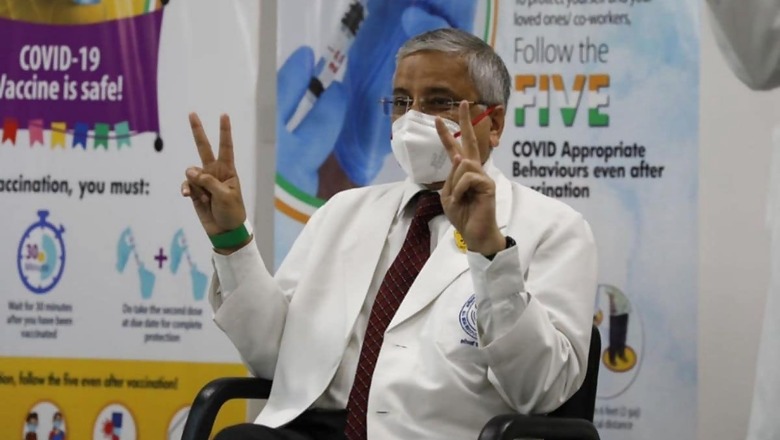
views
As the country witnesses a rising number of mucormycosis cases amid the COVID-19 pandemic, AIIMS Director Dr Randeep Guleria said there is a need to aggressively work on preventing the fungal infection. He said that cases of fungal infection will probably come down as the COVID-19 cases decrease.
Amid reports of four white fungus cases being detected in Patna Medical College Hospital on Thursday, the AIIMS director said, “The most important thing to remember is that mucormycosis is not a black fungus. It is a misnomer… because there is some discolouration of skin as it decreases blood supply, it may give a feeling that the area has become black, that is why the name has come.”
Explaining the cause behind mucormycosis and what can be done to prevent it, Guleria said, “If one is having steroids for a long period of time, has underlying predisposing condition like diabetes, you are predisposed to many fungal infections, one that is being seen more commonly is mucormycosis. Fungal infections like aspergillosis can also be there. There are some reports of that but it is not that much of a problem as mucromycosis is, which is predominantly involving the synuses, the eye and at times it can go on to the brain and have nasal involvement. There have been some reports of pulmonary mucormycosis.”
“There are people who are at a high risk, they need to be careful about sugar control. We have to be very careful about use of steroid. Not using it early because there is data which suggests that early use of steroids predisposes to secondary infection, both bacterial and fungal. And also the doses and duration of steroids need to be closely monitored because that itself also predisposes. The viral infection itself, presence of diabetes and use of steroids all need to be closely monitored if you need to prevent this from happening,” he said.
On being asked why only India is reporting cases of black fungus even as steroids are used all over the world, he said, “The steroid prescription all over the world are very closely monitored. In our country, a lot of misuse happens. You can buy anything over the counter and very high dose medication are given. There is no regulation to ensure things are not given over the counter.”
Warning against rampant use of blood thinners, Guleria said, “There is no indication of taking blood thinners on day 1. People who have mild illness don’t need to take blood thinners. A lot of use of blood thinners can predispose you to internal bleeding. They have side-effects to. It should not be taken on an outpatient basis.”
Early reports suggest that the current vaccines in India produce only half as many anti-bodies against B.1.6.1.7 strain. On the question of the possibility of a third and fourth jab, he said, “As the virus mutates, we will have to study how effective the vaccines are because the virus will try and develop immune escape mechanism. There is a likelihood that in the near future we will need to take a booster jab and we may need to take regular vaccines… so as to cover for variant which may emerge and to make sure the vaccine efficacy is as high as possible.”
“The current data suggests that although the efficacy of vaccine may come down with the new variants, it will still be above the 50 per cent mark, which the WHO had taken as the cut-off for the efficacy of vaccine. Most vaccines have the efficacy varying from 80 to more than 90 per cent. Even if there is a slight decrease, it will still be effective. But there is a need for close monitoring with gene sequencing to see new variants which emerge and evaluate them in terms of the efficacy of vaccines available,” he said.
Speaking on the government’s move to increase gap between the two vaccine doses, Guleria said, “Data that has emerged in the last few months suggests that if you delay the second dose by 12 weeks, you get a much better immune response and better protection.”
On mixing of two different vaccines, he said, “Currently, we don’t have enough data as far as the vaccines in India are concerned.”
Defence Minister Rajnath Singh and Health Minister Harsh Vardhan on Monday released the first batch of anti-Covid oral drug 2-DG, developed by the DRDO. The Drugs Controller General of India (DGCI) approved the 2-deoxy-D-glucose (2-DG) drug for emergency use as an adjunct therapy in moderate to severe coronavirus patients earlier this month.
However, Guleria said the drug is yet to be added to government’s protocol on COVID-19 treatment. “We have not tried it and are planning to study its efficacy. We need more data before we can say that it will be a game changer. It is early to say if it will be effective in overall management strategy. Currently it is not part of government of India’s protocol because we need more data on it.”
Further addressing the fears of third wave of coronavirus affecting the children more than the adults, Guleria said, “There is not enough evidence to say that the third wave is going to predominantly affect the children. I think even in the coming wave will be protected because of the very nature of the virus that it causes less infection in children.”
But the AIIMS director still assured that measure are being taken to ensure children are protected from the virus. “We will have some degree of protection for children because there are trials of vaccines for children and data should be out soon. Most vaccinologists think that the vaccine should be safe in children…Hopefully, in the next 3-4 months we will have vaccine approved for children,” he said.
Explaining the reason behind children showing less cases of infection, he said, “There are multiple factors which could be the related to why children are not infected so much. One factor is that the ace receptors to which the virus binds itself to the human cells are relatively less in children as compared to adults.”
“There is enough epidemiological evidence to suggest that even if the whole family is infected, it causes much milder disease in the children. It should continue even as the new waves come,” he said.
Read all the Latest News, Breaking News and Coronavirus News here. Follow us on Facebook, Twitter and Telegram.















Comments
0 comment